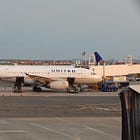When Strikes Ground More Than Just Flights
Looking at the other side of the Air Canada strike, and what travellers can actually do if they're impacted
I’ll be honest: I usually side with airline crews when it comes to their pay and benefits. They work hard, always take good care of me, and I believe they deserve to be paid fairly for the often thankless job they do. Especially with the increased demands, like unruly travellers, the job isn’t as glamorous as it maybe once was. But as the Air Canada strike looms and flights are already being cancelled, I can’t help but feel that something important is being overlooked: the impact on the people who bought those tickets in the first place.
This isn’t just about business travellers getting an unexpected day at home. For many, it’s about missing a once-in-a-lifetime vacation they’ve saved for over years. It’s about the bride whose family can’t make it to her wedding. The grandfather who doesn’t get to meet his new grandchild. The family reunion that won’t happen for another decade, if at all. These moments and missed experiences can’t be compensated for with a voucher or refunded like a seat upgrade.
Air Canada has already stated that affected passengers will get a refund. That’s good, but it’s far from the whole picture. They’ve also been clear that they’re not liable for “sequential damages”: things like prepaid hotels, tours, or connecting flights on different airlines. For many people, those costs are significant, sometimes representing some or all of their life savings. Some of those bookings are non-refundable, and when the trip evaporates, so does that money.
What you can actually do if you’re impacted by a strike
If you find yourself in the middle of this mess, don’t just accept a refund for the flight and walk away. There are still steps you can take to protect yourself — and maybe even recover more of your costs.
First, check your travel insurance. Even if you didn’t buy a standalone policy, your credit card might include trip cancellation or interruption coverage if you booked your flights or hotels with it. Policies vary, so read the fine print carefully, but labour disruptions are sometimes covered events.
Even though Air Canada says they aren’t liable for anything beyond the ticket, file a claim with them anyway. Be detailed, keep records, and don’t be discouraged when the initial answer is “no.” Airlines have escalation processes, and a polite but persistent follow-up can sometimes lead to (goodwill) compensation or a different outcome.
And don’t wait for the airline to reach out. Monitor your booking at least daily, and sign up for text or app notifications. Cancellations often appear in the system before official emails are sent. If your flight is cancelled, ask about rebooking options, including alternate routes or even seats on other airlines. The airline you booked with does have some obligation to help you, even though they will be busy this weekend. Sometimes an earlier or later flight through a different city can get you there faster than waiting for the “next available” option they first suggest.
If you can afford it, you may even opt to make alternate arrangements on your own (with a different airline, if you can find availability), and try to get compensated later. Taking action quickly can make a difference. By the time you wait for Air Canada to take action, that open seat on a different airline most likely will be gone. But of course, there’s no guarantee you’ll get any or all of your money back, and the few remaining seats on other airlines likely won’t be cheap.
If you do get stranded, keep every single receipt for hotels, meals, taxis, or alternative transport. Even if your first claim is denied, these can support a later insurance payout or airline reimbursement. And while call centre hold times will be painful, try private messaging Air Canada through social media in parallel. I’ve had faster responses that way than by phone alone. And as always, once you do get someone on the phone (or social media), be firm but polite: the people still working and trying to help you are not having a great weekend either. A kind word, but also not taking “no” for an answer, may get you further than starting off angry (even though you likely will be).
For those travelling to weddings, reunions, or other fixed events, have a backup plan ready. This could mean checking alternate airports or even other modes of transport like trains or rental cars so you can pivot quickly if the worst happens. And if your premium credit card has a concierge service, now’s the time to use it, they can sometimes rebook you or find accommodation faster than you can on your own.
Strikes ripple beyond the picket line
I’m not here to say crews shouldn’t strike, or that they shouldn’t fight for fair pay. But I think it’s time we stop pretending these disputes only inconvenience a few people. Strikes ripple out far beyond the airport. They affect travellers emotionally, financially, and in ways that can’t always be measured in dollars.
If we’re going to keep having these conversations about labour rights, and we should, we also need to have them about passenger rights. Because at the end of the day, when planes stop flying, it’s not just schedules that get grounded. It’s moments in people’s lives they’ll never get back.
Get Into Action
If you’re travelling soon, whether this weekend or later in the year, take five minutes today to check your insurance coverage, confirm your bookings are refundable where possible, and bookmark the claims page for your airline. This is good information to have handy regardless of what may or may not happen during your trip.
If you want to learn more about making your travels more resilient, and sometimes even upgrading for free, my Travel Revolution course shares practical strategies for protecting your trips, stretching your travel budget, and making the most out of every journey.
If you are stuck out there (or at home) - good luck. I hope the clues in this post are beneficial.








